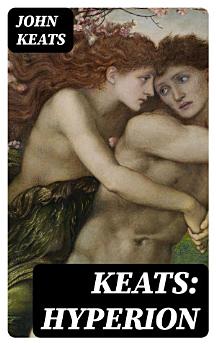Keats: Hyperion
John Keats
nvb 2022 · DigiCat
E-book
25
Pages
family_home
Éligible
info
reportLes notes et avis ne sont pas vérifiés. En savoir plus
À propos de cet e-book
In "Hyperion," John Keats explores profound themes of beauty, mortality, and the struggle for poetic transcendence, weaving a tapestry of lush Romantic imagery and deep philosophical inquiry. This unfinished epic poem draws inspiration from classical mythology, particularly the Titan Hyperion, embodying a narrative steeped in the tension between the sublime and the human condition. Keats employs a rich, lyrical style that fuses personal anguish with universal truths, set against the backdrop of an evolving 19th-century literary landscape that sought to reconcile the spiritual and the material. John Keats, an emblematic figure of the Romantic period, faced significant personal challenges, including the death of loved ones and his own declining health, which profoundly influenced his creative output. His deep appreciation for beauty—both in nature and art—is evident in "Hyperion," revealing his quest for meaning amid the turmoil of existence. Keats's engagement with Hellenistic themes reflects his desire to elevate the human experience through poetic expression, establishing a legacy that resonates through the ages. "Hyperion" is an indispensable read for anyone interested in Romantic literature, offering insights into Keats's thought processes and emotional resilience. The poem's exploration of the artist's plight parallels contemporary struggles, making it timeless in its appeal. Readers will find themselves captivated by Keats's lyrical genius and the haunting beauty of his unfinished vision.
À propos de l'auteur
John Keats (1795–1821) stands as one of the most celebrated English Romantic poets. His oeuvre, although remarkably short due to his early death from tuberculosis at the age of 25, left an indelible mark on English literature. Born in London, Keats pursued medical studies before fully devoting himself to poetry. Heavily influenced by the classics, his writing is characterized by sensual imagery and a profound appreciation for the beauty of the natural world. 'Hyperion,' an epic poem published in 1820, exemplifies Keats' ambitious lyrical voice and mastery of blank verse. It draws from Greek mythology, depicting the fall of the Titans and the rise of the Olympian gods, capturing the transformative power of suffering and the plight of the artist. Though his work sold poorly during his lifetime and critics initially dismissed it, Keats' reputation grew posthumously. His letters and the 'Odes' written in 1819, including 'Ode to a Nightingale' and 'Ode on a Grecian Urn,' are considered pivotal in the Romantic canon. Keats' poetry extols the imagination and the senses, establishing him as a counterpoint to the rationalism of the Enlightenment and heralding the modern poetic form with its introspective, personal expression.
Donner une note à cet e-book
Dites-nous ce que vous en pensez.
Informations sur la lecture
Smartphones et tablettes
Installez l'application Google Play Livres pour Android et iPad ou iPhone. Elle se synchronise automatiquement avec votre compte et vous permet de lire des livres en ligne ou hors connexion, où que vous soyez.
Ordinateurs portables et de bureau
Vous pouvez écouter les livres audio achetés sur Google Play à l'aide du navigateur Web de votre ordinateur.
Liseuses et autres appareils
Pour lire sur des appareils e-Ink, comme les liseuses Kobo, vous devez télécharger un fichier et le transférer sur l'appareil en question. Suivez les instructions détaillées du Centre d'aide pour transférer les fichiers sur les liseuses compatibles.








